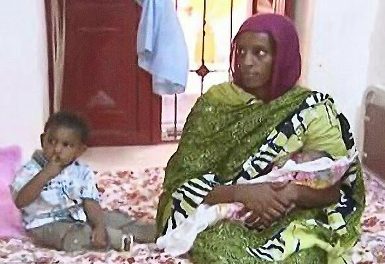EU, religious leaders dismayed by Sudanese woman’s apostasy death sentence
May 10, 2014 (BRUSSELS) – Top officials from the European Union have issued a joint statement expressing their “deepest dismay and concern” over the fate of Sudanese Christian woman Meriam Yahya Ibrahim, who was last month sentenced to death by hanging for refusing to recant her faith.

It was signed by the president of the European Commission, José Manuel Barroso, president of the European Council Herman van Rompuy and president of the European Parliament Martin Schulz, as well as religious leaders participating in the meeting.
Ibrahim, who recently gave birth to a baby girl in prison, was sentenced to death and one hundred lashes after she was convicted on charges of apostasy and adultery.
She was initially given three days to recant her faith and return to Islam, with a Sudanese court subsequently handing down the decision after she refused.
The presidents of EU institutions and religious leaders “underline Sudan’s international obligation to protect the freedom of religion and belief and unanimously call upon the responsible Sudanese authorities and appeal courts to revoke this inhumane verdict and release Mrs Meriam with the utmost urgency,” the declaration said.
EU officials and religious leaders have also welcomed an appeal lodged by Ibrahim’s legal team, which will be hard by Sudan’s Court of Appeal.
They have urged “the Sudanese government – in line with universal human rights – to repeal any legal provisions that penalise or discriminate against individuals for their religious beliefs or for changing their religion or beliefs”.
“Freedom of religion and belief is a universal human right that is valued highly by the European Union and needs to be protected everywhere and for everyone,” the statement adds.
The meeting in Brussels brought together Muslim, Christian and Jewish leaders to discuss the role of religion in EU development.
Ibrahim has been incarcerated with her 20-month-old son Martin since her arrest in late January after she was accused of adultery by relatives on her father’s side of the family.
Although she married in 2011, under Sudan’s Islamic Shari’a law the union is considered invalid and therefore adulterous as her husband is a Christian man. The charge of apostasy was added later after Ibrahim asserted that she was not a Muslim.
Ibrahim was born to an Ethiopian Christian mother and Sudanese Muslim father, but was raised according to her mother’s faith after her father abandoned the family when she was six years old.
The EU statement notes that “Sudan has ratified the relevant UN and African Union conventions and thereby has an international obligation to defend and promote freedom of religion or belief, which notably includes the right to adopt, exchange or abandon one’s religion or belief of one’s own free will”.
Ibrahim’s case has sparked international outrage Ibrahim’s case has sparked international outrage and there are growing calls for her unconditional release.
US senators last month urged secretary of state John Kerry to personally intervene in the case and offer Ibrahim political asylum in the US, while several EU member states have summoned Sudanese ambassadors in their respective countries regarding the case.
UN human rights experts called the conviction as “outrageous”, saying the right to marry and start a family was a fundamental human right, while UK prime minister David Cameron has described the sentence as “barbaric”.
Meanwhile, the EU says its delegation in Khartoum continues to closely follow the case.
(ST)
